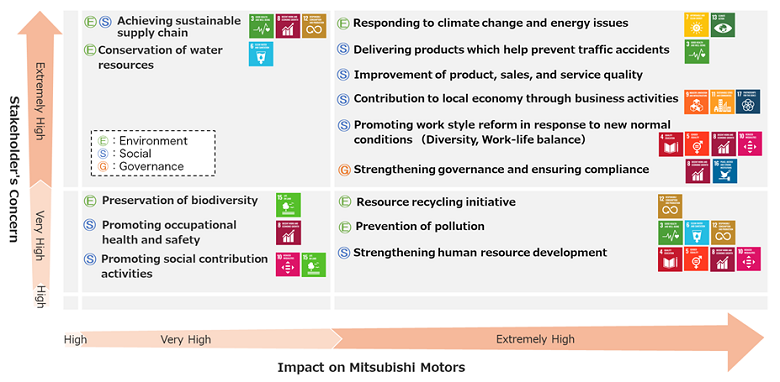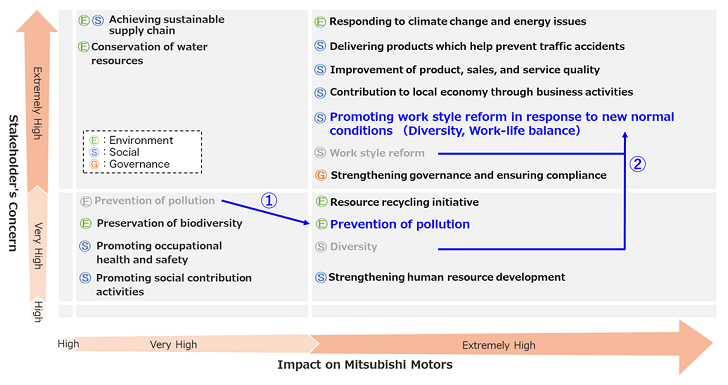MITSUBISHI MOTORS recognized importance of the United Nations Sustainable Development Goals (SDGs) and identified material issues (materiality) as the important issues that it should wrestle from various problems of environment, society, and governance fields in 2018.
We have since reviewed the material issues, considering our responses to increasingly severe environmental problems and the changing social situation due to the COVID-19 pandemic. The revised material issues were resolved by the Board of Directors meeting in October 2020.
Based on the new materiality, we will formulate targets and KPIs and promote our activities.

Key Points of the Revision
Figure: Direction of the Revision of the Material Issues  |
|---|
| ① Materiality on "Environment" |
| In recent years, climate change, resource depletion, environmental pollution and other environmental problems have grown apparent and become more serious. Adoption of the international targets and rules to address social issues has accelerated. Those include the United Nations Sustainable Development Goals (SDGs), the Paris Agreement (an international accord on climate change), and the recommendations by the Task Force on Climate-related Financial Disclosures (TCFD).MITSUBISHI MOTORS has formulated the "New Environmental Plan Package" and announced it in November 2020, recognizing that it is necessary to set the direction of medium- to long-term efforts based on these social trends in order to keep the business alive.The New Environmental Plan Package positions "Pollution prevention" as a priority environmental issue along with "Action to climate change" and "Resource circulation". Therefore, in terms of materiality, we have raised the impact on our company of "Pollution prevention" (on the horizontal axis of the figure) from "very high" to "extremely high". |
| ② Materiality on "People" |
| Considering our responses to the new normal triggered by the COVID-19 pandemic, we have reviewed the material issues of "Work style reform" and "Diversity" and merged them into "Promoting work style reform in response to new normal conditions (Diversity, Work-life balance)". Through the review, we have presented the directions to heighten organizational capabilities and enhance corporate value by creating an environment where diverse employees can maximize their individual abilities and play an active role.In July 2020, we established the Flexible Working Styles Consideration Committee. The committee is tasked with creating flexible working styles that enable individual employees to maximize their potential, unfettered by time and location. We introduced remote working as a stopgap measure to help halt the spread of COVID-19. We are now looking at ways to adopt this approach on a more permanent basis, transitioning to a flexible working style that will balance work and an enhanced quality of life. |
